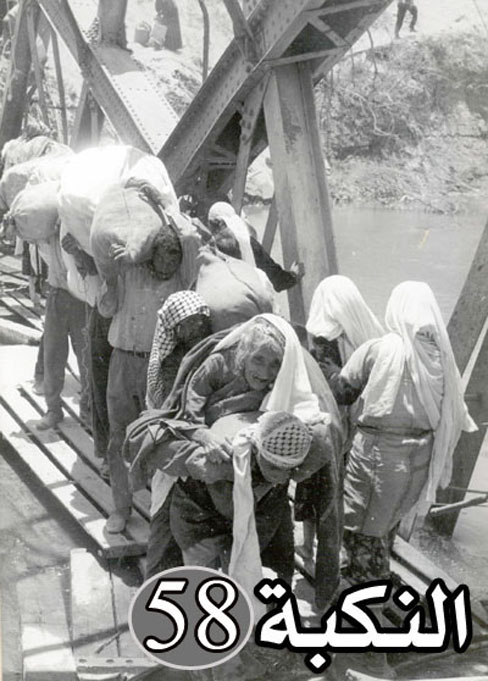On the 58th anniversary of the Nakba, or the “Catastrophe,” prominent Palestinians share their thoughts on the day when more than 700,000 of their brethren became refugees.  The Institute for Middle East Understanding asked the panel, ranging from business leaders to comedians, what comes to mind on the 58th anniversary of the Nakba and why Americans should care. The result is “The Nakba: Then and Now.”
The Institute for Middle East Understanding asked the panel, ranging from business leaders to comedians, what comes to mind on the 58th anniversary of the Nakba and why Americans should care. The result is “The Nakba: Then and Now.”
 Khaldoun Baghdadi is a lawyer and Chair of San Francisco’s Human Rights Commission. |
Khaldoun Baghdadi
When you reflect on the 58th anniversary of the Nakba, what comes to mind?
I think of my mom walking into a refugee camp as a young girl. I think of the door my grandfather installed on our home in Safad, which he locked for the last time that day. I think of that clean, white house with the blue door, and wonder what it would be like for my kids to play in the courtyard. I think of my dad as a teenager working for the British army collecting bodies. I move from confusion to sadness to anger that the world allowed this to happen, and permits it to continue.
Why should Americans care about the Nakba, 58 years later?
No American would tolerate being expelled from their home, and then be told they are a “demographic threat.” Americans need to know that a massive group of people were forcefully stripped of their homes and land on the basis of being Christian and Muslim. None of them have the right to return. No civilized nation would tolerate that.
 Sam Bahour is a Palestinian-American businessman and activist based in Palestine. |
Sam Bahour
When you reflect on the 58th anniversary of the Nakba, what comes to mind?
This year’s anniversary of the Nakba generates a myriad of emotions. The international community has turned a blind eye while so many Palestinian refugees, generation after generation, continue to be born into despair. During the last 6 years, we have relived another Nakba that has been applied in the most modern and sophisticated ways of oppression known to mankind, but this time no one fled. The Palestinians have been screaming at the top of their voice, if they are not heard now, a new generation will know nothing but life under the same illegal Israeli occupation as the previous one. Allowing Palestinians to be locked up (and down) and treated as animals can only result in more innocent lives being lost, on both sides of the Green Line.
Why should Americans care about the Nakba, 58 years later?
Sadly, the average American has been programmed to accept Israeli spin, verbatim. Even worse, American politicians have been programmed to blindly be led by Israel’s powerful lobby in the US, AIPAC, many times in clear contradiction to US interests in the Middle East. 58 years of instability in one of the world’s most strategic regions can be directly associated to the US’s application of double standards in defense of Israel’s dispossession of Palestinians and Israel’s continued illegal military occupation.
The Nakba is not a memorial for the dead. It is a remembrance of the living, of a proud and steadfast people yearning to return home and begin the bitter and difficult process of repatriation. Every US citizen who would like to see a stabilized Middle East — one that does not breed violence, but vehemently breeds tolerance, should use this Nakba Day remembrance to make their voice heard and call for Israel to let the refugees return home. This is the only real painful “concession” that Israel must learn to accept, not necessarily because it wants to, but because its creation stipulated it doing so.
 George E. Bisharat is a professor of law at Hastings College of the Law in San Francisco. |
George Bisharat
When you reflect on the 58th anniversary of the Nakba, what comes to mind?
I think first of my grandfather’s home in Jerusalem that was expropriated by the Israelis in 1948, and for which compensation has never been paid. But more than that, I think about the hundreds of thousands of other Palestinians who were forcibly expelled by Israeli troops or fled in fear, and who have not been as fortunate as me to find a secure and prosperous life in the United States. These more than five million Palestinians live almost within a stones throw of their homes and their homeland, and their right to return has been consistently recognized by the international community, yet nothing has ever been done to effectuate that right.
Why should Americans care about the Nakba, 58 years later?
The Nakba, or the destruction of Palestinian society in 1948, is at the heart of the Israel-Palestine conflict. While our government has often stated support for Palestinian rights, as a matter of practice and increasingly over time, the United States has supported Israel in its drive to control most or all of historic Palestine. This support by the United States, which takes military, economic, and diplomatic forms, has caused enmity against the United States throughout the world. This anger at our role is particularly acute in the Middle East, which is an area of vital interest to the United States and the world. So fellow Americans need to understand how damaging to our international standing and our national interests our role in this conflict has been.
 Diana Buttu is a Palestinian-Canadian lawyer based in Gaza. |
Diana Buttu
When you reflect on the 58th anniversary of the Nakba, what comes to mind?
As a child of a Nakba survivor, I am haunted by the image of thousands of Palestinians fleeing to safety and I am left wondering what the Palestinians were living through that would make them flee their homes for safety. As a resident of Gaza, the daily Israeli shelling and frequent bombing raids have terrorized me. And, while I have often thought of leaving, I remain, as do most Palestinians. In the height of these bombing campaigns, I often think back to the Nakba and convince myself that I can live through it.
A dear Jewish friend of mine once told me that her mother was haunted by the faces of the people who idly watched her get on a truck that shipped her off to a concentration camp. I, too, am often left wondering what the watchers-by were thinking in 1948. More hauntingly, however, I am left wondering whether Israelis ever think that their state, which is supposed to be a haven for Jews, caused the dispossession of so many Palestinians. Have they not become the people who idly watched the Palestinians get on trucks?
Why should Americans care about the Nakba, 58 years later?
The unconditional support provided to Israel, in the face of Israel’s continued dispossession of the Palestinians, is the source of much of the discontent towards the United States in the Middle East. Arabs see the double standards in U.S. foreign policy: while the U.S. advocates (and even fights for) the return of Bosnian and East Timorese refugees, Palestinian rights are extinguished by the U.S.; while the U.S. claims that it supports civil rights, the U.S. also supports a state that advocates superior rights for a certain class of people; while the U.S. is opposed to the taking of property without compensation, it supports regime after regime in Israel who make no secret of the fact that they have stolen property in the past and will continue to do so in the future. This unresolved issue will continue to serve as problem for Israel and the U.S. for another 58 years unless a just resolution is achieved.
|
Lena Khalaf Tuffaha is a co-founder of the IMEU. |
Lena Khalaf Tuffaha
When you reflect on the 58th anniversary of the Nakba, what comes to mind?
I think about the growing problem that my children are going to have to deal with. Refugees have grown in number and their problems have deepened and worsened. Their problems are going to be made worse by the passage of time. I think the longer the international community, the Israelis and Palestinians wait to do justice for the refugees, the more likely my children, the Palestinians of tomorrow, will have to deal with this crisis because we haven’t been able to do it ourselves.
Why should Americans care about the Nakba, 58 years later?
We should care about the Nakba because a great injustice was committed against a defenseless population. I think it’s an injustice that should and can be righted. That would help to dramatically increase respect for America throughout the Arab world — if America for once stood up for the people that were really victimized. We care deeply about justice, so it’s an issue that Americans can understand and relate to.
 Saree Makdisi is a professor of English and Comparative Literature at UCLA. |
Saree Makdisi
When you reflect on the 58th anniversary of the Nakba, what comes to mind?
How remarkable it is that the most obvious injustice can be perpetuated for so long — and not even recognized for the injustice that it is; and how absurd it is that so much of the media misrepresentation of Palestine/Israel hinges on blaming the victims of what even Israel’s own apologists frankly acknowledge was an act of ethnic cleansing.
Why should Americans care about the Nakba, 58 years later?
The dispossession and injustice experienced by the Palestinian people, beginning in 1948, is the foundation of most of the instability in the Middle East. America was once a much beloved country, a symbol to many Arabs in the nineteenth and early twentieth centuries of freedom and justice; America’s blind and unconditional support for Israel since the late 1960s has done nothing but hurt the image of the US in the Arab world.
 Maysoon Zayid is an actress and professional stand-up comedian. |
Maysoon Zayid
When you reflect on the 58th anniversary of the Nakba, what comes to mind?
What instantly comes to mind is the fact that the people who became refugees in 1948 are still refugees now; that the situation 58 years later has still not been solved. Did these people who left their homes thinking they would go back in a few days have any idea that generations later their great grandchildren would be living in camps? There is still no solution and more and more children are being born in the camps.
Why should Americans care about the Nakba, 58 years later?
The U.S. had a hand in the partitioning of historic Palestine, and the result has been unrest in the Middle East for 58 years. Since the U.S. was pivotal in creating this whole situation, Americans should be concerned about it. At the same time, there are many more things that Americans need to care about — such as the wall in the West Bank and the ramifications of its construction. With what occurred during the Nakba and having seen what a horrible result that was, Americans should think twice about supporting current Israeli policy, such as the construction of the wall.


